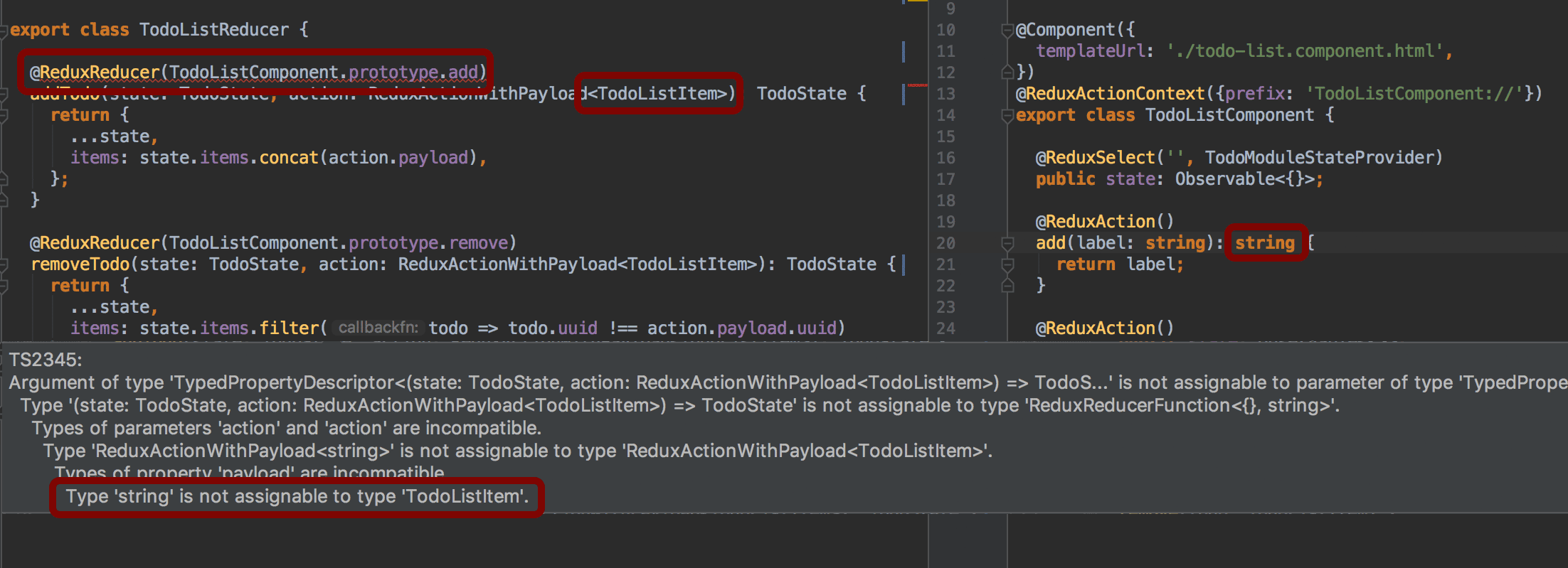This package contains a number of features that make working with Redux very easy for you. For example, you can easily decorate a method with @ReduxAction. This method then sends a redux action every time it is called. In addition to @ReduxAction there're some more decorators available like @ReduxActionContext, @ReduxReducer, @ReduxSelect and @ReduxState. But that's not all! By using this package, you can also access your redux state directly from your view.
<pre>{{ 'some/state/path' | reduxSelect | async | json }}</pre>
Another big advantage of this package is the very good TypeScript support. Now you'll get a compiler error if the payload of the redux action is not compatible to the reducer function.
Of course, this package works perfectly with RxJS and the AOT compiler.
Redux is a popular and common approach to manage a application state. The three principles of redux are:
The redux package is not shipped with @harmowatch/ngx-redux-core. Therefore you also had to install the redux package.
$ npm install redux @harmowatch/ngx-redux-core --saveAs the first step, you need to add ReduxModule.forRoot() to the root NgModule of your application.
The static forRoot method is a convention
that provides and configures services at the same time. Make sure you call this method in your root NgModule, only!
Lazy loading is also supported
import { NgModule } from '@angular/core';
import { BrowserModule } from '@angular/platform-browser';
import { ReduxModule } from '@harmowatch/ngx-redux-core';
import {YourModuleStateProvider} from '...';
import {TodoListReducer} from '...';
@NgModule({
imports: [
BrowserModule,
ReduxModule.forRoot({
state: {
provider: YourModuleStateProvider, // You'll create it in step 2
reducers: [ TodoListReducer ], // You'll create it in step 4
}
}),
],
providers: [
YourModuleStateProvider // You'll create it in step 2
],
})
export class AppModule {
}Now you have to create a provider for your module in order to describe your state.
import { Injectable } from '@angular/core';
import { ReduxState, ReduxStateProvider } from '@harmowatch/ngx-redux-core';
export interface TodoListItem {
uuid: string;
label: string;
creationDate: string;
}
export interface YourModuleState {
todoListItems: TodoListItem[];
}
@Injectable()
@ReduxState({name: 'your-module'}) // Make sure you choose a application-wide unique name
export class YourModuleStateProvider extends ReduxStateProvider<YourModuleState> {
getInitialState(): Promise<YourModuleState> { // You can return Observable<YourModuleState> or YourModuleState as well
return Promise.resolve({
items: []
});
}}
}Don't forget to add the state as described in step 1
To initiate a state change, a redux action must be dispatched. Let's assume there is a component called
TodoListComponent that displays a button. Each time the button is clicked, the view calls the function
addTodo and passes the todo, which shall be added to the list. All you have to do is decorate
to the function with @ReduxAction and return the TodoListItem as a return value.
import { Component } from '@angular/core';
import { v4 } from 'uuid';
import { Observable } from 'rxjs/Observable';
import { ReduxAction } from '@harmowatch/ngx-redux-core';
import {YourModuleStateProvider, TodoListItem} from '...';
@Component({templateUrl: './todo-list.component.html'})
export class TodoListComponent {
@ReduxAction()
addTodo(label: string): TodoListItem {
return {
uuid: v4(),
label,
creationDate: new Date().toISOString(),
};
}
}Now @harmowatch/ngx-redux-core will dispatch the following action, every time the addTodo method was called.
{
"type": "addTodo",
"payload": "SampleTodo"
}That was easy, wasn't it?
There's one more thing you need to do. You're firing an action, but at the moment no reducer is listening to it. In order to change this, we need to create a reducer function that can make the state change as soon as the action is fired.
import { ReduxReducer, ReduxActionWithPayload } from '@harmowatch/ngx-redux-core';
import {TodoListItem} from '...';
import {TodoListComponent} from '...';
export class TodoListReducer {
@ReduxReducer(TodoListComponent.prototype.add)
addTodo(state: TodoState, action: ReduxActionWithPayload<TodoListItem>): TodoState {
return {
...state,
items: state.items.concat(action.payload),
};
}
}Don't forget to add the state as described in step 1
I am still working on the documentation, but I wanted to release the new 0.2.x version of the package as soon as possible. Therefore, the latest version of the documentation will only be available on Github for the time being, in order to avoid an unnecessary version patch for each update.

